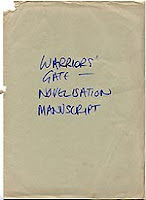 Given that I'm a zillion miles from the action and not even an American writer, this isn't the place to come for front-line news on the WGA strike.
Given that I'm a zillion miles from the action and not even an American writer, this isn't the place to come for front-line news on the WGA strike.But what's going on out there is an important and necessary step in evolution that's going to affect us all, and we'll be feeling its effects sooner rather than later. Evolution is usually a long and slow process. But occasionally you get a vital adaptation being jump-started by some one-off event.
I reckon this strike is one such event. What's on the table is a necessary reconstruction of our industry's business model. Not the usual selling and distribution issues but the behind-the-scenes, vital-essence, imaginative gruntwork sector on which the entire citadel of entertainment endeavour is raised.
We're in a business that absorbs, develops and exploits new technologies with astonishing speed. But when it comes to the rightful channeling of income from new technologies, caution, delay, and outright avoidance are suddenly the orders of the day.
I'm not going to add my voice to those who portray the AMPTP as an organisation of mendacious, avaricious, unprincipled limbs of Satan (although I'll make an exception for anyone driving through the picket lines with obscene gestures at those whose inner lives provide the entire foundation for their own livelihoods.)
I'm not rushing to criticise because there's no point in despising the entrepreneurial class for simply doing what they do. It's the function of an entrepreneur to pay as little for a creator's work as they can possibly get away with, and to sell it to a customer for as much as they can possibly charge. And then to hold on to as much of the difference as their long arms can carry. That's the nature of the beast, and most of the time it suits us for them to be active and out there.
 They'll give writers a fair deal on emergent technologies when they have to. Otherwise, they won't. Any more than you or I would feed unnecessary coins into a parking meter or pay more than the cover price for our daily newspaper.
They'll give writers a fair deal on emergent technologies when they have to. Otherwise, they won't. Any more than you or I would feed unnecessary coins into a parking meter or pay more than the cover price for our daily newspaper. Many's the producer for whom I've written and rewritten a proposal with no payment, my only recompense being the shrug he gives when the broadcaster turns it down. The system works that way because it can. He knows that if he tries the same thing with his electricity supplier, the lights will go out. His landlord will evict him. His broadband supplier will cut him off. So them, he pays in full without a second thought.
With that mindset, why address the shift in the revenue stream from traditional media to newer technology-driven systems if you don't have to?
The writers' strike presents the entrepreneurial sector with the necessary You Have To.
For that reason alone, the AMPTP should be grateful to the WGA. Downloading is going to be the dominant delivery system of the future, no question about it. But the AMPTP's entrepreneurial hardwiring is preventing it from coping with the change. By requiring them to cope, the WGA are enabling them to move forward.
The alternative would be a slow, steady, spreading rot of disaffection and inefficiency. When you let that happen in any field, something different arises and leaves you behind.
I'm not in the WGA, but I'm a former Northern Chair of the Writers' Guild of Great Britain and we're affiliated. Here in the UK we already have a basis for participation in download revenues, but it's in everyone's interests to see the principle made universal. No WGGB member will provide material for American production, and no non-member should be thinking of it either - try it, and when the dispute ends you'll be shut out of the US market for life.
 I've been involved in three strikes in my time, and none was entered into lightly. One I can't really count; it was a building workers' strike and I was a student on a vacation job, so I wasn't putting my livelihood on the line the way that the real workers were. But I was also an ACTT member involved in the long ITV strike of 1979, and when I launched off as a freelance writer and joined the Guild in 1980 - partly as a result of the taste of the life that the ITV strike had given me - I was asked to withhold novelisation rights to my Doctor Who scripts as part of a campaign that led to UK publishing's first Minimum Terms Agreement.
I've been involved in three strikes in my time, and none was entered into lightly. One I can't really count; it was a building workers' strike and I was a student on a vacation job, so I wasn't putting my livelihood on the line the way that the real workers were. But I was also an ACTT member involved in the long ITV strike of 1979, and when I launched off as a freelance writer and joined the Guild in 1980 - partly as a result of the taste of the life that the ITV strike had given me - I was asked to withhold novelisation rights to my Doctor Who scripts as part of a campaign that led to UK publishing's first Minimum Terms Agreement.OK, so it wasn't exactly the Gdansk shipyards. But it did bring a change for the better.






































No comments:
Post a Comment